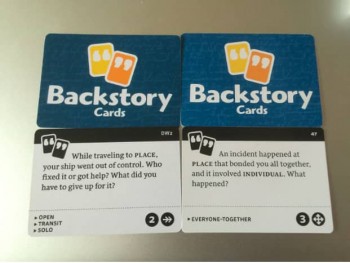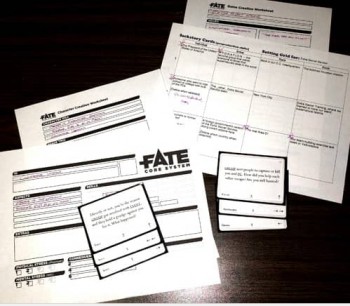Backstory Cards: for Roleplayers, Writers, and Game-Runners

So, our friend Tim Rodriguez came by our home a few weeks back when we were hosting a game-night. We’d thrown the doors open to a bunch of game-lovers of our acquaintance for a night of food and play, and they flocked in with their favorite games (Wari, or Oware, being the game that got the most giggles) and some very fine (I was told) single malt whiskey. (Or maybe it was double-barreled? Something. I don’t know; I was too busy making lasagna.)
Anyway, Tim brought some new Backstory Cards to playtest. Most of us (including me) who volunteered to playtest with him hadn’t role-played in, well, ever. Or at least for years, the fog of memory obscuring most of the details.
. . . But since we were just testing the cards for story-potential and not playing an actual game, it seemed to work out well enough, and pretty soon we were all, like, a gaggle of giant fungal glow-in-the-dark monster crabs running around ravaged urban landscapes bringing down mobsters. You know. Like you do.
And sometime in all the chaos, Tim may have mentioned something about a new Kickstarter project.
In addition to being a vitaculturist, a musician, and an ardent consumer of super hot chilis, Tim is also the owner of Galileo Games. His imprint, Brooklyn Indie Games, published the first two sets of Backstory Cards, as well as Emma Larkins’ Heartcatchers. He also created the OmegaZone setting for Fate Accelerated, and the Ghost Pirates board game—all successful Kickstarter projects! He’s also a three-time judge for the Cardboard Edison awards and has written for the Bulldogs! and Urban Shadows RPGs.

His current Kickstarter is going toward publishing game-designer Ryan Macklin’s Backstory Cards Volume 2.
Ryan Macklin’s most well-known for co-creating the award-winning Fate Core System and The Dresden Files Roleplaying Game, as well as for being an editor at Paizo Publishing, creators of the Pathfinder Roleplaying Game. He’s worked on dozens of other games, including The Leverage Roleplaying Game, recent sourcebooks for Mage: the Ascension, a variety of indie RPGs, and his own Mythender.
Anyway, after Tim sang us his new Krampus song on the guitar he’d hauled with him all the way from Brooklyn (busking away on the busy New York streets on his way over to our house), I was all like, “TIM, LET ME INTERVIEW YOU FOR BLACK GATE, TIM! ABOUT THE NEW KICKSTARTER FOR BACKSTORY CARDS VOLUME TWO, TIM!”
And he said yes, and then (weeks later, of course) I sent him questions, and (a few hours later) he and Ryan sent me all their answers, and here we all are.
And so!
I giiiiivvveeee youuuuuu, ladies and gentlemen and non-binary peoples of Earth . . .
THE INTERVIEW!

CSEC: Tell us a bit about what inspired Backstory Cards? What are some of its diverse uses, both for a solitary person and for a group?
RYAN: A few Gen Cons ago, I ran a short session of Fate for Wil Wheaton. He wanted an introduction to Fate, but had limited time and we were all a little wiped by that Saturday night. I’ve been using directed questions as part of character creation for years, but that session I felt like I was dragging some. After that Gen Con, I wished I had something that would reduce the cognitive load of having to come up with questions. Some months later, I had a prototype and brought it to a con to get feedback.
The basic use for Backstory Cards is to create a web of things people care about during character creation, with other characters and world elements. I’ve heard some people tell me they’ve used Backstory Cards for fiction writing. Others have used them during play, not just at character creation. Every now and then, I hear some new way of using the cards in unexpected ways, which makes me pretty happy.
TIM: I use Backstory Cards and the setting grids as fodder basis for on-the-fly storytelling. Asking other people at the table to contribute very very basic details such as a name or a place can lead into a wild frontier of unexpected narrative.
What is your background in gaming? What about fantasy? What are some ways gaming and fantasy have intersected in your life?
RYAN: I was a GURPS GM way, way back when. I did convention GMing for Steve Jackson Games for a few years, and that’s how I started to get to know folks in the industry. While I don’t play GURPS anymore, I still have a soft spot for it. As far as fantasy goes, my fantasy is urban, modern. Tolkien stuff is neat and all, but the Fantastic Today really gets me going. I love games like Mage: the Ascension and Unknown Armies (both of which I got to write for long after becoming a fan).
TIM: I started doing a podcast on games, travel, and creativity as part of giving back to a community that had staved off a lot of work-travel loneliness. I interviewed people, had a useful conversation starter and something to offer, with which to meet people I respected (including Ryan, actually) and started making games myself a few years after that.
As for fantasy, I’ve been an avid reader forever. I’ll read pretty much anything, nailed down or no, but especially fiction. The biggest places these have interacted are the Middle Earth: The Wizards collectible card game, which I played and collected obsessively. I know a full half of my Tolkien trivia from poring over those cards and of course fantasy roleplaying.

What are some other ways (than gaming) these story-building tools might be used?
RYAN: The main one I’ve already mentioned, where fiction writers use the prompts when they’re stuck or as an exercise in focused writing. Maybe one of the weird things about Backstory Cards is it isn’t exactly a tool for _games. It’s a tool for stories; we just happen to focus on games because a lot of other worldbuilding tools focus on a single source of answer rather than assuming structured group collaboration.
TIM: The proprietor of one of my favorite local game shops tells me that she sells Backstory Cards to writers, all the time. I love them as a prompt for writing game settings and worlds.
Tell us some funny or favorite moments that have come out of either the creation of these cards?
RYAN: I honestly can’t tell you of any specific moment. Every time I bring the cards out to a convention game, I get surprised and delighted. To be honest, if I didn’t personally get that feedback loop I wouldn’t use the cards.
TIM: It occurs to me, that a story that Ryan doesn’t necessarily know is that I used questions and prompts that bore a certain similarity to Backstory Cards at the same convention where I also met Ryan for the first time. Sort of a Newton-Liebniz thing of our own. And then when Ryan called me with production questions about this thing he’d made, I had a visceral need to be involved. And I’m thrilled how well that’s worked out so far.
This is Volume 2 of Backstory Cards; what are you trying to do with this expansion set?
RYAN: The original deck and first expansion work great as they are, as tools for tying characters and established setting elements together. The next two expansions offer nuanced prompts for different, narrower setting concepts. Along with that, inspirational tools for coming up with those setting elements the core prompt system uses.
For me as the creator, I want these cards to show people new ways to think about character and setting interplay.
TIM: As much as people love the setting-neutral cards in the first two decks, there’s also a lot of demand for prompts to fit people’s favorite styles of stories. So we’ve added more. Plus, the Setting Elements cards are designed to help out with the world-building aspects. These cards prompt you about things like the role a character might play in a story or their motivations; about designing locations and history. These cards are less focused on putting the characters together and more about putting the world together, and I’m already getting a ton of use out of them in my own work.
Thanks, guys!
Dear Readers, check out Backstory Cards Vol. 2 on Kickstarter, going till May 1st, 2018!